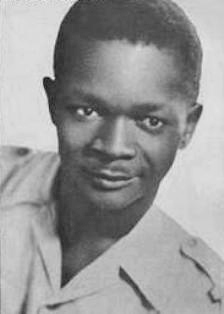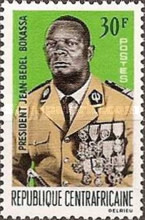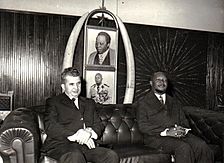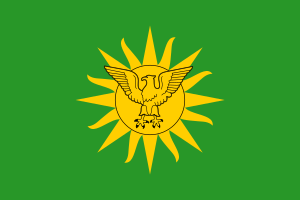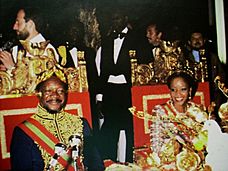Jean-Bédel Bokassa facts for kids
Quick facts for kids Jean-Bédel Bokassa |
|||||
|---|---|---|---|---|---|
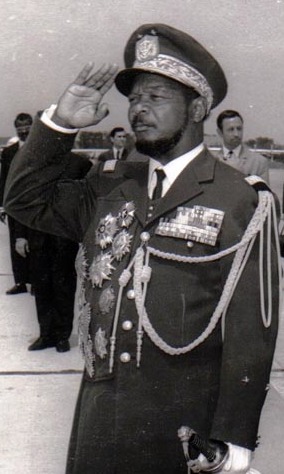
Bokassa in 1970
|
|||||
| 1st Emperor of Central Africa | |||||
| Reign | 4 December 1976 – 21 September 1979 | ||||
| Coronation | 4 December 1977 | ||||
| Predecessor | Himself as President of the Central African Republic | ||||
| Successor | Empire abolished | ||||
| Prime Minister | Ange-Félix Patassé Henri Maïdou |
||||
| 2nd President of the Central African Republic | |||||
| In office | 1 January 1966 – 4 December 1976 | ||||
| Coup d'état | 31 December 1965 | ||||
| Predecessor | David Dacko | ||||
| Successor | Himself (as Emperor) | ||||
| Prime Minister | Elisabeth Domitien Ange-Félix Patassé |
||||
| Born | 22 February 1921 Bobangui, Ubangi-Shari, French Equatorial Africa (now Central African Republic) |
||||
| Died | 3 November 1996 (aged 75) Bangui, Central African Republic |
||||
| Spouse |
|
||||
| Issue |
|
||||
|
|||||
| House | Bokassa | ||||
| Military career | |||||
| Allegiance |
|
||||
| Branch |
|
||||
| Service years | 1939–1979 | ||||
| Rank | Marshal | ||||
| Wars | |||||
| Awards | |||||
Jean-Bédel Bokassa (born 22 February 1921 – died 3 November 1996) was a leader from the Central African Republic (CAR). He was the second president of the CAR. Later, he became the self-proclaimed emperor of the Central African Empire. He ruled from 1966 until 1979.
Bokassa was president for about eleven years. Then he was emperor for three years. His rule was like a military dictatorship. His time as emperor lasted from December 1976 to September 1979. After he was removed from power, the Central African Republic became a republic again. Bokassa's title as emperor was not recognized by other countries.
After his rule, Bokassa faced legal challenges. He was found responsible for serious wrongdoings. His sentence was changed from death to life in prison. He was later set free in 1993. Bokassa lived a quiet life in Bangui until he passed away in 1996.
Contents
Early Life and Education
Bokassa was born on 22 February 1921. He was one of twelve children. His father, Mindogon Bokassa, was a village chief. His mother was Marie Yokowo. They lived in Bobangui, a village in French Equatorial Africa. This area is now the Central African Republic.
His father resisted French rule and forced labor. He was beaten to death in 1927. Bokassa's mother died a week later. His family decided he should get a French education. He went to a mission school in Mbaïki. His teachers called him "Jean-Bédel" because he liked a French grammar book by that name.
As a teenager, Bokassa studied in Bangui. He also studied in Brazzaville, where he learned to cook. In 1939, he joined the French colonial troops. This was based on advice from his grandfather and a teacher.
Military Career and Rise to Power
Serving in the French Army
Bokassa joined the French army just before World War II started in September 1939. He quickly rose through the ranks. He became a corporal in 1940 and a sergeant major in 1941. He fought with the Free French Forces. He took part in important battles in France and Germany during the war.
After the war, he stayed in the French Army. He studied radio transmissions. He also attended officer training school in Senegal. In 1950, he went to French Indochina. He was a transmissions expert and saw combat during the First Indochina War. For his bravery, he received important awards like the Légion d'honneur.
Bokassa returned to France and taught radio transmissions. He was promoted to second lieutenant in 1956 and lieutenant in 1958. In 1961, he became a captain. The French colony where he was born became the independent Central African Republic (CAR) in 1960.
Leading the Central African Army
In 1962, Bokassa left the French Army. He joined the new Central African Armed Forces. He was a cousin of the CAR's first president, David Dacko. He was also a nephew of Dacko's predecessor, Barthélémy Boganda. Because of these family ties and his military experience, he quickly became a leader. He was put in charge of creating the country's military. By 1964, he was the commander-in-chief of the army.
Bokassa wanted to be recognized as an important leader. He often wore his military medals in public. He sat next to President Dacko at ceremonies to show his importance. Some people in Dacko's government worried about Bokassa. They thought he might try to take control of the country. Dacko, however, didn't think Bokassa was a threat. He even said Bokassa was "too stupid to pull off a coup d'état".
To protect his power, Dacko created a special police force called the gendarmerie. He also had a presidential security guard. These groups were meant to stop any attempts to overthrow the government.
Political Challenges and the Coup
Growing Problems in the Country
In 1964 and 1965, Dacko's government faced many problems. The economy was not growing. The government system was struggling. There were also border issues with rebels from neighboring countries. Dacko tried to get help from other countries. He started diplomatic relations with China in 1964. China offered a large loan, but it wasn't enough to fix the country's financial problems.
There was also a lot of corruption in the government. Bokassa felt he needed to take over to solve these issues. He especially wanted to remove the influence of communism. Some experts believe Bokassa's own desire for power was the main reason he decided to act.
Planning the Takeover
In July 1965, Dacko sent Bokassa to Paris for celebrations. When Bokassa wanted to return, Dacko stopped him. Bokassa was very angry. He spent months trying to get support from the French and Central African armies. Eventually, Dacko allowed him to return in October 1965. Bokassa claimed that French President Charles de Gaulle himself told Dacko to let him return.
Tensions between Dacko and Bokassa grew. In December, Dacko approved more money for the gendarmerie but not for Bokassa's army. Bokassa told friends he was planning a coup. Dacko planned to replace Bokassa as his military adviser. He also wanted to promote officers loyal to him and demote Bokassa.
Dacko's plans were not a secret. Elders from Bokassa's village heard about them and told him. Bokassa realized he had to act fast. He worried his small army would not be able to defeat the gendarmerie and presidential guard. He also feared France might send troops to help Dacko, as they had done in another African country.
Bokassa got strong support from Captain Alexandre Banza. Banza commanded a military base in Bangui. Like Bokassa, he had served in the French Army. Banza was smart and ambitious. He played a big part in planning the coup. Many people in the country sensed that political trouble was coming. Dacko's advisers warned him that Bokassa seemed unstable and needed to be arrested. But Dacko did not listen.
The Coup d'état
On the evening of 31 December 1965, Dacko left his palace. An hour and a half before midnight, Banza gave the order to start the coup. Bokassa called the head of the gendarmerie, Izamo, to a military camp. When Izamo arrived, Bokassa and Banza told him about the coup. Izamo disagreed with the coup and was taken prisoner.
Around midnight, Bokassa, Banza, and their soldiers left the camp. They quickly took control of Bangui. They went to the palace to arrest Dacko, but he wasn't there. Bokassa worried Dacko had been warned. He ordered his soldiers to find Dacko.
Dacko was arrested by soldiers outside Bangui. He was brought back to the palace. Bokassa told him, "I tried to warn you — but now it's too late." Dacko was taken to prison. Bokassa then ordered all prisoners to be released. He took Dacko to a military camp and forced him to resign.
In the morning, Bokassa spoke on the radio. He announced that the army had taken control. He said Dacko's government had resigned. He promised a new era of fairness for everyone. He also said the army would protect the people and their property.
Early Years of Bokassa's Rule
When Bokassa first took power, he promoted himself to the public. He showed off his French army medals. He wanted to show his strength and bravery. He created a new government called the Revolutionary Council. He canceled the country's constitution and closed the National Assembly. He said the Assembly no longer represented the people.
Bokassa promised future elections and a new constitution. He also said he would give up power once communism was gone, the economy was stable, and corruption was fixed. He allowed one political group to continue, but banned all others.
Bokassa introduced new rules. People aged 18 to 55 had to prove they had jobs or face fines or prison. Begging was banned. Drum playing was only allowed at night and on weekends. A "morality brigade" watched over bars and dance halls. He also started a public transport system in Bangui.
Gaining International Recognition
Bokassa found it hard to get other countries to recognize his new government. He tried to explain that he had to act to save the country from communism. He claimed Chinese agents were training people for a revolution. On 6 January 1966, he sent Chinese agents out of the country and ended relations with China. He also said the coup was needed to stop corruption.
He first got recognition from Chad's president, François Tombalbaye. They agreed to help each other if either was in danger of losing power. Soon, other African countries started to recognize Bokassa's government. At first, France was hesitant to support him. But after Bokassa threatened to leave a financial zone, French President Charles de Gaulle visited the CAR. This visit showed that France had accepted Bokassa's rule.
Challenges to His Power
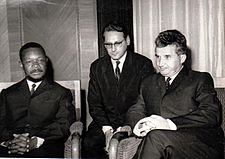
Bokassa and Banza, his co-conspirator, started to disagree. Banza did not like Bokassa's expensive spending. Bokassa moved to a military camp to feel safer from Banza. Banza tried to gain support from soldiers. Bokassa sent soldiers loyal to Banza to the border. He brought his own loyal soldiers closer to the capital. In 1967, he asked France for protection. France sent 80 paratroopers to Bangui.
In 1968, Bokassa demoted Banza to a less powerful role. Banza became more critical of Bokassa. A year later, Banza made strong comments about Bokassa's handling of the economy. Bokassa saw this as a threat and demoted him further. Banza then planned another coup. He sought support from Lieutenant Jean-Claude Mandaba. However, Mandaba was loyal to Bokassa.
When Banza told his co-conspirators about the coup plan, Mandaba immediately informed Bokassa. On 9 April, when Banza entered a military camp, he was captured. Bokassa nearly beat Banza to death. Mandaba suggested a trial for show. Banza was tried by a military court. He admitted his plan but said he didn't intend to kill Bokassa. He was executed and buried in an unmarked grave.
Bokassa's Rule in the 1970s
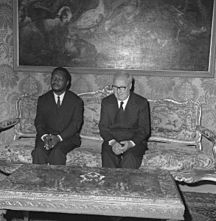
In 1971, Bokassa promoted himself to a full general. On 4 March 1972, he declared himself "president for life." He survived another attempt to remove him from power in December 1974. The next month, he appointed Elisabeth Domitien as prime minister. She was the first woman to hold this position. Bokassa's policies became harder to predict. This led to another attempt on his life in February 1976.
International Connections
The leader of Libya, Muammar Gaddafi, helped Bokassa. France also supported him. In 1975, French President Valéry Giscard d'Estaing called Bokassa a "friend and family member." France gave the CAR money and military help. In return, Bokassa often took Giscard on hunting trips. He also supplied France with uranium, which was important for France's nuclear energy and weapons programs during the Cold War. Bokassa also renewed ties with China and visited the country in 1976.
The cooperation with France was very strong. This was especially true during Bokassa's imperial coronation ceremony. This event took place on 4 December 1977. The French Defence Minister sent soldiers to secure the ceremony. France also lent 17 aircraft to Bokassa's government. They even sent French Navy personnel to help the orchestra. The coronation lasted two days. It cost a lot of money, more than the CAR's yearly budget. A French artist organized the ceremony. Bokassa's special crown was made by a Parisian jeweler. Bokassa sat on a two-ton throne shaped like a golden eagle.
Later, a French newspaper reported that Bokassa had given diamonds to Giscard in 1973. This became a big political scandal in France. It hurt Giscard's chances of being re-elected in 1981. The relationship between France and the CAR changed a lot. French intelligence learned that Bokassa was willing to work closely with Gaddafi.
After meeting Gaddafi in September 1976, Bokassa converted to Islam. He changed his name to Salah Eddine Ahmed Bokassa. People believed he did this to get money from Libya. However, no money came. This conversion also conflicted with his plans to be crowned emperor in a Catholic cathedral.
Becoming Emperor
In September 1976, Bokassa dissolved the government. He replaced it with a new council. On 4 December, he converted back to Catholicism. He then created a new constitution. This changed the republic into the Central African Empire (CAE). He declared himself "His Imperial Majesty" Bokassa I. He was formally crowned on 4 December 1977.
Bokassa's full title was "Emperor of Central Africa by the will of the Central African people." His coronation and the style of his new empire were inspired by Napoleon. Napoleon had changed the French Republic into the First French Empire. Bokassa's coronation cost about $20 million. This was a third of the CAE's yearly budget. It was also all of France's aid money for that year.
Bokassa said that creating a monarchy would help Central Africa "stand out." He believed it would earn the world's respect. Even with many invitations, no foreign leaders attended the event. By this time, many people thought Bokassa was acting strangely. The Western press often made fun of him. They compared his behavior to other unusual African leaders.
Bokassa claimed the new empire would be a constitutional monarchy. But in reality, he kept all the power he had as president. The country remained a military dictatorship. People who disagreed with him were often punished. There were rumors that Bokassa himself sometimes took part in beatings.
Overthrow of the Empire
Public Unrest
By January 1979, France's support for Bokassa was almost gone. There were food riots in Bangui. Many civilians were harmed. The final turning point came between 17 and 19 April. Many elementary school students were arrested. They had protested against paying for and wearing expensive school uniforms. These uniforms had Bokassa's picture on them. About 100 children died during these events.
The news of these deaths spread worldwide. This led to a successful plan to remove Bokassa from power. French troops invaded the CAE. They restored former president Dacko to power on 20 September 1979.
French Military Operations
Operation Caban began on the evening of 20 September. It was the first part of removing Bokassa. A secret team from French intelligence, along with paratroopers, secured the airport in Bangui. They met little resistance.
Two more French military planes arrived with over 300 troops. A message was sent to start the second phase, Operation Barracuda. Helicopters and aircraft came from Chad. They occupied the capital city to ensure peace.
The Empire Falls
By 12:30 AM on 21 September 1979, David Dacko, who was pro-French, announced the end of the CAE. He declared that the Central African Republic was restored, with him as president. Dacko remained president until he was overthrown in 1981. Bokassa was visiting Libya at the time. He fled to Ivory Coast and lived there for four years. Then he moved to France. He was allowed to live in his chateau near Paris. France gave him political protection because of his service in the French military.
During his seven years in exile, Bokassa wrote his memoirs. He complained that his French military pension was not enough. However, French courts ordered that all copies of his book be taken and destroyed. This happened after his publisher claimed Bokassa said he shared women with French President Valéry Giscard d'Estaing. Bokassa's presence in France was embarrassing for many government officials who had supported him.
Later Life and Legacy
Return and Legal Proceedings
Bokassa had been found responsible for serious wrongdoings in his absence in 1980. He returned from exile on 24 October 1986. He was immediately arrested by Central African authorities when he got off the plane in Bangui. He faced charges related to his time in power. Since he was now present, the law required a new trial for him. Bokassa pleaded not guilty to all charges.
The Trial and Aftermath
Bokassa's trial began on 15 December 1986. It took place in the Palace of Justice in Bangui. He hired two French lawyers. The trial was open to the public, which was unusual for Africa at the time. Radio and television broadcast the trial across the country and to neighboring French-speaking countries.
Throughout the trial, Bokassa denied the charges. He tried to blame other members of his former government and the army. He said, "I'm not a saint. I'm just a man like everyone else." Sometimes, he showed his famous short temper. He once yelled at the prosecutor, saying, "It's all about Bokassa, Bokassa, Bokassa! I have enough crimes against me without you blaming me for all the wrongdoings of the last twenty-one years!"
On 12 June 1987, Bokassa was found responsible for many of the charges. The court found strong evidence in about twenty cases. Bokassa was sentenced to death. His lawyers appealed the decision. The Central African Supreme Court rejected the appeal.
On 29 February 1988, President André Kolingba changed Bokassa's sentence. He changed it from death to life in prison. The next year, he reduced the sentence to twenty years. When democracy returned to the CAR in 1993, Kolingba declared a general pardon for all prisoners. Bokassa was released on 1 August 1993.
Bokassa stayed in the Central African Republic for the rest of his life. In 1996, as his health got worse, he made unusual claims. He said he was the Thirteenth Apostle. He also claimed to have secret meetings with Pope John Paul II. Bokassa died of a heart attack on 3 November 1996, at age 75. He had seventeen wives and many children.
His Place in History
In 2010, President François Bozizé issued a special order. It officially recognized Bokassa as "a son of the nation." The order stated that he was "recognized by all as a great builder." This act removed his past legal punishments. Before this, some politicians in the CAR praised Bokassa. They noted his love for his country and the times of stability he brought.
Titles and Awards
His Imperial Title
His Imperial Majesty Bokassa the First, Apostle of Peace and Servant of Jesus Christ, Emperor and Marshal of Central Africa
Awards from His Own Country
- Sovereign Knight Grand Cordon with Collar of the Imperial Order of Bokassa
- Sovereign Knight Grand Cordon of the Imperial Order of Central African Merit
- Sovereign Knight Commander of the Imperial Order of Agricultural Merit, 1st Class
- Sovereign Knight of the Imperial Decoration of Recognition, 1st Class
Awards from Other Countries
- Cameroon: Grand Cross of the Order of Valour
- Chad: Grand Cross of the National Order of Chad
- Congo: Grand Cross of the Order of Merit
- Egypt: Grand Cross with Collar of the Order of the Nile
- France:
- Grand Cross of the Legion of Honour
- Military Medal
- Croix de guerre 1939–1945
- Croix de guerre des théâtres d'opérations extérieures
- Volunteer Combatant Cross Medal of 1939–1945
- Volunteer Combatant Resistance Cross Medal
- Overseas Medal
- Free France Voluntary Service Commemorative Medal
- 1939–1945 Commemorative War Medal
- Indochina Campaign Commemorative Medal
- Gabon: Grand Cross of the Order of the Equatorial Star
- Ivory Coast: Grand Cross of the National Order of the Ivory Coast
- Madagascar: Grand Cross of the Order of the Republic
- Morocco: Knight Grand Cross with Collar of the Order of Ouissam Alaouite
- Libya: Grand Cross of the Order of the Republic
- Senegal: Grand Cross of the National Order of the Lion
- Sudan: Grand Cross of the Order of the Two Niles
- Togo: Grand Cross of the Order of Merit
- Tunisia: Grand Cross with Collar of the Order of Independence
- Yugoslavia: Grand Cross of the Order of the Yugoslav Star
- Zaire: Grand Cross of the National Order of the Leopard
Images for kids
See also
 In Spanish: Jean-Bédel Bokassa para niños
In Spanish: Jean-Bédel Bokassa para niños
 | Georgia Louise Harris Brown |
 | Julian Abele |
 | Norma Merrick Sklarek |
 | William Sidney Pittman |


